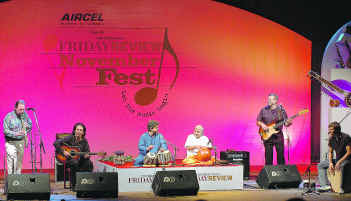
Date:23/11/2005 URL: http://www.thehindu.com/thehindu/mp/2005/11/23/stories/2005112300770500.htm
Metro Plus Bangalore Chennai Hyderabad
The musical melting pot
| That fusion music is a great unifier was evident at the Swedish band Mynta's performance |

PLENTY OF PEP The members of Mynta during the show PHOTO: K.V. Srinivasan
It's no longer news that the kind of men George Bernard Shaw called "eleven flannelled fools" have become sporting icons the world over. The eminent writer's jokes are becoming obsolete in the music world too, as today's musicians increasingly prove they can indeed play the first fiddle and conduct an orchestra all at once.
The members of Mynta, founded by Swedish bass player Christian Paulin, who works in close partnership with Indian tabla exponent Fazal Qureshi, feel quite at home playing one another's compositions, passing the lead to each other without missing a note.
Mynta's performance for The Hindu Friday Review November Fest at Kamaraj Hall started on a quiet note with the number "Yellow Fellow". The low-key synthesiser effect provided by Santiago Jiminez was quickly taken over by Dallas Smith on the bamboo flute. His long notes were given a contrasting back up by Max Ahman, who strummed his acoustic guitar to sur mandal-like effect.
Scintillating refrains
Percussionist Ola Bothzen provided shimmering sounds using ankle bells and quiet vibrations by running his finger round the edge of the cymbals on his drum set. The group then went on to the rousing "Red Departure" from Mynta's latest album "Tea Break", in which Jiminez took up his violin to play scintillating refrains.
Mynta's music is hard to define, perhaps because the group has done a good job of amalgamating varied musical influences into its own mould. Here and there, they throw out familiar notes - it could be Indian, it could be an Arab touch - but they end as simply rousing good tunes, played with a lot of pep and mostly ending on a dramatic, abrupt cut after building to a rhythmic crescendo.
Rhythms galore
With Qureshi in the group since 1987, it is not surprising the compositions have a strong rhythmic component. This performance offered other rhythmic delights as well. An impromptu request to ghatam maestro Vikku Vinayakram, an old and revered associate, added not only star value but a reminder of the long history of fusion experiments by stalwarts of both the Hindustani and Carnatic music traditions.
If rhythm is what Vinayakram and Qureshi live and breathe, Smith is not far behind with his calculations in the Hindustani mould. Trained in the Hindustani flute for over a decade at Ali Akbar Khan's school of music in the U.S., Smith has a penchant for adventuring into the tricky world of half matras. His composition "Seven-and-a-Half" blended the Hindustani concept of `sade saat' beats with a blues rhythm. The melodic refrain of seven-and-a-half beats was an attractive one. This time, Smith played the saxophone.
Once the idea of mathematical virtuosity was introduced, there was no stopping them. Qureshi's composition "Hot Madras" (which he liked to call "Almost Seven") was set to six-and-a-half beats. "Hot Madras" provided an opportunity for Qureshi and Vinayakram to take flight. If the ghatam maestro thrilled with his sheer speed, the strength and variety of his strike, he also took the audience on a long journey of combinations and permutations, factoring and multiplying the number six and a half. When Qureshi took over, he emphasised the salient characteristics of a leather-topped tuned drum, with its varied `bol' sounds. Throughout the evening, Bothzen never ceased to impress with his range of drums.
"Touga", in which Smith returned to the bamboo flute, with Jiminez on the violin, was soothingly melodious. It came as no surprise when Paulin announced he composed the piece at the birth of his daughter Touga. All the maths was dispensed with, as Bothzen used the triangle, in combination with Qureshi's simple tabla rhythms that might be described as sarva laghu.
Besides, there were the dancing rhythms of the Scotland-inspired pieces by Ahman, and wild audience participation in pieces like "Fuzzy", where Vinayakram had everybody clapping to fill in the `blanks'.
Mynta's performance reinforced what delights artistes and audiences alike. Fusion music is a great unifier, a constant education and an improviser's dream come true.
ANJANA RAJAN
© Copyright 2000 - 2005 The Hindu